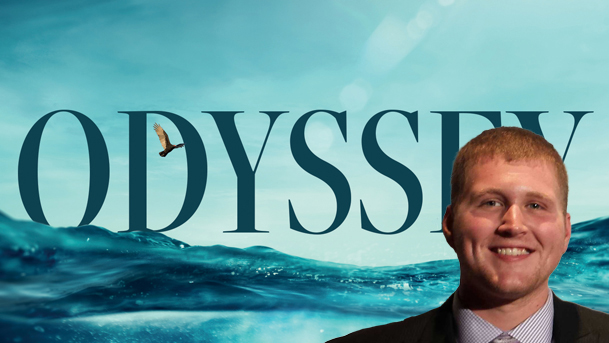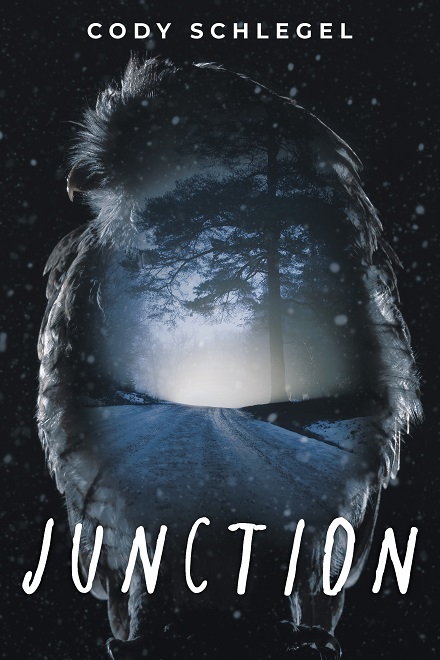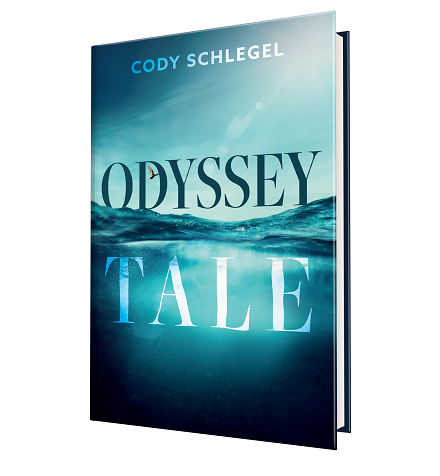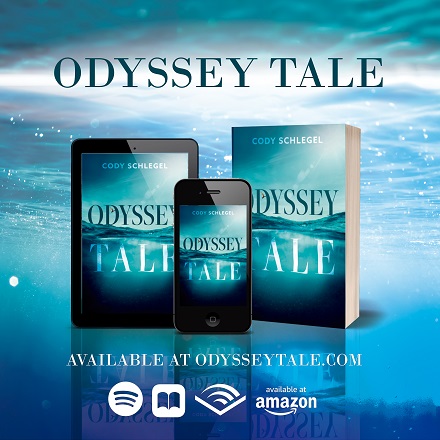Last week, Tellest had the wonderful opportunity to look into a wonderful book from a budding author. Odyssey Tale has the epic scope that we here at Tellest love, while giving us the sort of twists and turns that keep us glued to whatever seats we like to read in. Cody Schlegel, the author of Odyssey Tale, has offered us the chance to learn more about him and his process, and that’s where this interview comes in. Read on to learn more about your newest favorite author!
Tellest: Hello Cody! I wanted to thank you for taking the time to give us some insight into who you are as a storyteller and as a person. I always find that the folks who are excited for an interview are also coincidentally among the busiest people I know. You’ve already accomplished a lot of interesting things in your life, and I’m excited to explore that a bit, and to introduce you to a growing audience!
Cody Schlegel: Thank you for your time and the opportunity to introduce myself to your audience.
T: It’s always my intention to begin my interviews by trying to understand the start of a storyteller’s creative journey. Who was it that set you off on your epic adventure? Was there a favorite author or other creative type, or maybe a member of your community or family that had you catching the writing bug?
CS: I can’t really remember any one single thing that set me off. As a little kid, I loved stories and really loved watching movies. Batman and Batman Returns were the first movies I really became obsessed with. We lived out in a pretty rural area, and I was an only child until I was four, so I didn’t have a lot of kids to play with. It was almost out of necessity that I had to use my imagination for entertainment.
T: Are you still obsessed with Batman? What do you think about the current state of the superhero genre, and did you ever expect the media to depict the comics as faithfully as they have been lately?
CS: I wouldn’t say obsessed, but I’m still definitely a big fan. As far as the current state of the superhero genre, I’m not sure I’m qualified to answer. I haven’t read or watched a lot of the new stuff that doesn’t involve Batman. And as I’ve gotten older, I’ve come to appreciate more of the classic graphic novels like Year One, the Dark Knight Rises, the Long Halloween, etc. But generally speaking, I do like when source material is well used and receives a proper homage.
T: We’re jumping ahead, perhaps, but your point about graphic novels now has me curious. Would you ever be interested in jumping into that medium? I feel like you’ve got the knowhow to be able to compose something like that, and you’ve got sort of personality and skill set that would lend itself to a collaborative work of that nature.
CS: That’s certainly a medium that I’m curious about and would give a shot. I don’t have any talent when it comes to the artwork, but I think I could paint a clear enough picture for someone who does.
T: So, let’s start by talking about your book, Odyssey Tale. As I understand it, it’s not your first book, the last one being a crime thriller that takes place in Iowa. It’s a bit harsh, realistic, and gritty. And while some of that translates over to Odyssey, that’s understandably more magical, so to speak. What was it like bouncing from one to the other, albeit with the gap of time between them?
CS: Junction (the crime thriller) actually bridged the gap between two different versions of Odyssey Tale. Originally, Odyssey was written for kids. It was much shorter, and I had the whole thing done, with the intended reader being between about 8 and 15 years old. But the final draft just didn’t land how I’d hoped, so it ended up getting shelved. Then I wrote the crime story, Junction, which was based on a TV show I had written and pitched. About a year or so after Junction was released, I toyed with the idea of re-working Odyssey Tale—more for an adult audience. I kept having this vision of Peter Pan cussing and the Lost Boys being a wild group of twenty-somethings. Then I started asking questions like, ‘what would Pinocchio be like as a grown man?’ and ‘what if Snow White’s stepmother didn’t actually talk to her mirror and just hallucinated everything?’ There are still quite a few elements of the G-rated version that survived the updates to the PG-13 version, but those questions really helped carve the story into something that the G-rated version couldn’t be.
T: We’ve seen a couple of sort of renaissance moments for fairy tale characters over the last few years, from the Once Upon a Time series, to the Descendants. Do you ever look to those for sort of inspiration, or was it just a happy coincidence that they came out while you were working on your stories, and you tended to look the other way?
CS: I knew of Once Upon a Time when I started the very first draft, but the Descendants didn’t come out until a few years later. I never really got much into Once Upon A Time, aside from making sure their universe wasn’t too similar to the one I was going for, but it was mostly other projects that served as the true inspiration. The Odyssey, first and foremost. I had enrolled in a Greek mythology course in 2012, and it was really the professor that got the whole thing going. He was explaining that the reason Homer’s Odyssey is so confusing and full of characters is because each character has their own back story. He went on to say that if someone took all the classic fairy tale characters and put them into one story it would be similar. And if someone stumbled upon that story and didn’t already know the characters, a lot would be lost. So I took that little tidbit to help me build a study-guide. I would replace one character with this name, and another character with that name, and the further I got into it, the more surprised I was at how well it all played out while staying loyal to the original Odyssey. I kept some characters the same, and altered others, but a lot of the major players were replaced with some of those familiar names. And to take it back to Batman. Graphic novels the Dark Knight Returns by Frank Miller served as inspiration, and even though it’s not a Batman book, Watchmen by Alan Moore also played a huge part. These stories really show more of the dark side of what it means to be a hero, to age as a hero, and they do a great job casting a light on the tragedy that can come with achieving glory. The past also plays a huge part in these stories. Fragments of the past trickle out, but a lot of it remains shrouded by mystery and hearsay. That particular element went hand in hand with the way Odyssey Tale plays out.
T: Everything comes from what’s been established before, but you’ve done an excellent job of making Odyssey Tale feel fresh and unexpected in all the right places. Outside of the projects that you’re currently working on, have you ever dreamed up your own sprawling worlds, and brand-new characters with their own epic stories?
CS: Nothing epic like the characters or universe that make up Odyssey Tale, but I’ve got several universes cooking outside of the Odyssey Tale and Junction realms.
T: An audiobook of your story is available on YouTube in its entirety. What made you decide to release your story in this manner—or, was it a recommendation you received from elsewhere? It feels a little “giving the cow away for free” in some ways, but, speaking as someone who does give plenty of stuff away free of charge, I can see the benefits of that in some cases.
CS: I released it through a service that put it out over a bunch of platforms. Spotify, Apple Music, and a few others. They’re the ones that put it out on YouTube. And I don’t mind if it’s out there on a few platforms for free. I’ve always lived by the philosophy that if you’re good enough at something, eventually you’ll get paid for it, so don’t be afraid to hand a free one out every once and a while.
T: On those platforms, you’ve got different talent reading your story for the audio content. If you were going to release a fully-fledged audiobook, who would you want performing the narration? Would it just be one celebrity, or would you want it to almost sound like an audio play, with a mix of voices?
CS: Katie Harvey is the narrator, and I’m really happy with what she’s done. I don’t think I could have picked anyone else. She had the voice I was going for. She needed zero direction and knew exactly what to bring to each line and each character. I do like the idea of different voices for different characters, though.
T: For those who aren’t familiar with the process, what was it like collaborating with a narrator who was going to read your book for an audience? Did you have to provide pronunciations, explain certain scenarios, things like that?
CS: Luckily, Katie was a complete professional in every sense of the word. There were only a few times where she slipped up with a word here or an edit there, and typically it was just an oversight. The only thing I can recall that stands out was the way she pronounced the name Cecil. With her accent, she pronounced it Seh-sull, but in the story, it’s See-sull.
T: Odyssey Tale ends in a way that should feel somewhat familiar to people who are aware of the original epic you’ve tapped into for inspiration. But, that said, you hint right in the last lines at what might come next. Was this an actual representation of a forthcoming sequel, or was it instead a tease and nothing more?
CS: Definitely just a tease. There will be no sequel. But, there will be a prequel. “Once Upon an Iliad” will take the story back to the beginning of the Trojan War, and conclude where Odyssey Tale begins.
T: Without trying to spoil too much, you leave off your characters in Odyssey Tale with a reference to another classic bit of literature that you could tap into. Does the prequel go off ina different direction, or sort of tap into that same location and anthology?
CS: I think the line you’re referring to calls back to the Arabian Night stories. If so, most definitely. I’d say Jinni will be revisited as a younger man. His character seems to be a fan favorite, and Odyssey Tale alludes to a lot of things relating to his past. And Aladdin’s brief involvement in Odyssey Tale will make him a crucial part of the prequel.
T: Once you’re done with the prequel, do you anticipate any of the fairy tales you wanted to talk about will end up on the cutting room floor? Any that you enjoyed when you were growing up not quite make it into these stories?
CS: I originally wanted to work in some characters from the Wizard of Oz, but I’m not sure I like that idea as much as time slips further ahead.
T: Let’s sidestep a little bit. I know that you’ve also worked on screenplays and received some praise for that as well. What are the chief differences that you find in working on a screenplay than a book?
CS: For me, the main difference is the timeline. It took a year to start and finish each book. Writing the first draft of the script could be something that one accomplishes over a weekend. None of mine have been that quick, but it can be done. And writing a book is way more demanding, in terms of attention to detail. Every single relevant moment has to be captured in a way that a screenplay doesn’t allow. Screenplays have a lot of moments where the reader has to tap into their own imagination and picture certain things or pick up on certain subtleties that would be more pronounced when reading a book. There’s also some technical jargon that establishes certain things in a screenplay that would be different from the way these things are presented in a book. Details like location, time of day, and the moods/thoughts of characters have to be condensed in such a way that they don’t take too much space away from dialogue. There are a lot of similarities between the two, though. Knowing how to do one will certainly help with the other. And if you’re thinking of writing a book, writing it for the screen first is a great way to get the vital moving parts down on paper. It also might help you find problem areas that you didn’t know existed. Then when it’s time to write the book, you can beef up those moving parts and turn the basic details into poetry.
T: So then, wrapping things back around, do you ever envision Odyssey Tale being done for the screen? When you work on your characters, do you imagine an established actor taking the part and sort of fancast them?
CS: That would be great. I’d love to see the whole thing play out on the big or small screen. I do picture certain actors, but they’re not necessarily all well-established. And it’s not limited to actors. I’ll tap into real life. People I know, or strangers often have a part in build the look or personality. It helps grease the wheels when coming up with dialogue or quirks or surface features.
T: I suppose with that in mind, knowing your skill set, you’re probably better situated than most where, if you wanted to, you could pitch this thing and see if it could find some sort of “Hollywood legs” so to speak. Have you ever pictured yourself converting it over to a screenplay now that the novel is done, and seeing if you could get any bites?
CS: Definitely. It would make a great movie or series. Very visual. Gripping. Incredible heroes and even more incredible villains. A lot of fun to be had.
T: If someone wanted to know more about Cody Schlegel, where would they go? Is there a website or a social media hub that you could point out to fans?
CS: My books are available at JunctionBook.com and OdysseyTale.com. Both these links will take you directly to the Amazon page. Odyssey Tale is also available on Audible, Apple Music, Spotify, and few others. I am on Linkedin, but no other social media platforms at this time.
T: What’s next for you after Odyssey Tale? I know you mentioned Once Upon an Iliad, but is that the next one in line, or are you taking another direction first?
CS: I’m really split on whether I should do that or get cracking on the Junction sequel. They’re both pretty well outlined, and ready to be written. I just have to decide which one wants to be written more.
T: In any case, I hope you have a good writing experience, and that you continue to find the same success in your talespinning.
Cody, I wanted to thank you again for taking the time to chat with me about your books, and about what sort of future projects you might be working on. I know that you must have been busy with your projects, so getting the opportunity to talk to you was most appreciated!
CS: Thank you for having me. I appreciate your time.
Once again, I’d like to offer my appreciation to Cody for giving me the opportunity to chat a bit more about his stories and his process. It’s always a great time talking to someone who is passionate about their characters and the worlds they build, and the events that make them as wonderful as they can be. Do be sure to keep an eye out for more projects from Cody in the future. And don’t forget to check out Odyssey Tale by Cody Schlegel on Amazon today!
Michael DeAngelo
Latest posts by Michael DeAngelo (see all)
- Fantasy Promo – Quinine - July 25, 2024
- Sigil Art – Grim’s Hold - July 24, 2024
- Fantasy Promo – Light the Shadows (Under Elfhame’s Stars) - July 24, 2024




